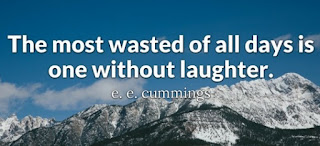TELL ME A STORY
Our family has had a history of sharing stories with each other. You know the kind of thing--what happened at school that day--what went on at the office--the news from downtown where I worked--news from Fort Wayne where the kids' dad worked . . . .These were what journalists and editors love to call "human interest stories," about real people, doing real things--maybe silly things, or scary things, or just being good human beings helping other human beings.
Recently my daughter mentioned hearing stories on National Public Radio while she was commuting. That triggered a memory for me: My Grandma Jenkins used to look at me (age six, at the time) and say, "Now don't story to me."
We kids all knew what that meant: don't make something up, don't lie, don't even fiddle around with the truth.
Little wonder I grew up knowing "stories," the kind people wrote and got published in magazines, weren't true. In school I learned they were called "fiction," and what I wrote in my own time wasn't true--it was made up. But what I wrote for the school paper--that had to be true. It was journalism. Reporting what happened.
-----
But I got to thinking about family stories. We all have them: the escapades of our ancestors as handed down through the generations, told at family gatherings like reunions, weddings, funerals, family visits on vacations. Embellished, maybe. Interesting? Oh, yes.
 |
| Remember doing this? |
Nowadays--I wonder: Do people still tell their stories? Share the funny and sad and heartwarming and heartrending stories of people we're all related to with the younger generations who'll never know those older folks?
I hope you do that--share all that wealth of family stories.
But in case you don't, here's a suggestion:
- get yourself a big spiral notebook, the 8 1/2 by 11 inches kind (dollar stores have them)
- find a pen you like to write with, or a pencil if that's your thing
- write a page about someone in your family, someone you can introduce to your children or grandchildren; title it with the someone's name
You've just started a memoir!
Here's something else to remember: Don't try to include absolutely everything you know about that person. This isn't a biography--it's one story about someone related to you and your descendants.
After you get going, you may find one page isn't enough to do justice to your ancestor. So--write another page!
As an aside: The celebrated novelist, E. L. Doctorow [who wrote Ragtime and World's Fair, among other works] said in an interview that he wrote 600 words a day--he typed 600 words single-spaced on a single sheet of paper. That was his output for the day. And since his novels are big ones, he kept on until he'd told the whole story.
You don't have to strive for thousands of words. Write a page, or maybe two. Depending on how large your handwriting is, that may be 300-500 words.
If you're finished with that ancestor, write about another one. I'll warn you--once you get into this writing habit, it's addictive. And best of all, it's fun!!
-----
As a bonus, I'll recommend a book to you. I confess I've not read it, just begun it. It's brand new, just out, called The Queen of Dirt Island, by Irish novelist Donal Ryan. You can find it on Amazon among other places.
Here's why I recommend it: Each chapter is 500 words long. Yup, that's 500 words. The title of each chapter is one word only. And you'll be amazed at how much you can learn about the characters in just 500 words. (That's about 2 pages of print.)
If you look for it on Amazon, you can use the "Look Inside" feature to read the first chapter. (And like the famous potato chips, I bet you won't stop at just one.)
-----
You don't have to plan to publish your writings, but do share them with family members, if you're able. Good luck! And happy writing!!
Blessings,
Thursday's Child
















